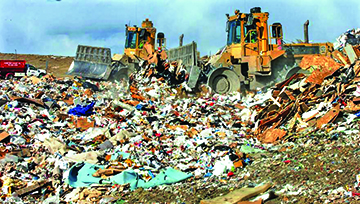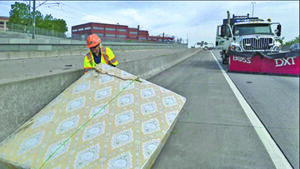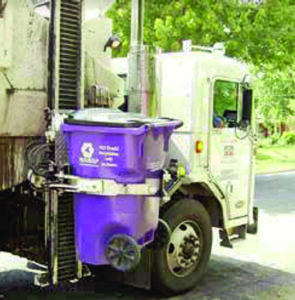Waste Management Struggles To Clear Garbage Glut Due To Funding, Staff, Policies, Plus An Aging Truck Fleet
by Glen Richardson

Scraping By: City Auditor Timothy O’Brien says Denver’s new trash collection program is not effectively designed to ensure stable funding, thereby worsening service and delivery to residents.
Welcome to the “Denver Dump,” where garbage and debris are overtaking our streets, highways, and neighborhoods. The city’s stunning landscapes are gasping in garbage.
What’s behind the Mile High waste management mess? Certainly, we’re all individually responsible. Coloradans create 47 tons of waste per person, ninth in the nation. Moreover, Colorado is creating the nation’s third most new waste per capita.
Cause of Denver’s growing garbage glut is complicated and confusing. It ranges from decisions such as removing dumpsters (to give police clear alleyway sight lines), to cutting extra trash collections from every four weeks to eight weeks. Lack of policies, data, funding, and staff are heightened by an aging waste collection truck fleet. Furthermore, the first citywide change in trash routes in 15 years is increasing spikes in missed trash pickups.
Mess Along Highways

Thoroughfare Trash: CDOT cleans up trash on highways and interstates around Denver, but their job focuses on debris blocking the road, not the trash. Credit: 9NEWS
In addition to Denver’s Waste Management, the Colorado Dept. of Transportation or CDOT, cleans up debris and trash along the highways and interstates around the city. Reports of trash piling up on the shoulders, medians, and off ramps are constant. The agency says their maintenance section is seeing an increase in littering based on debris calls, costs, and pickups. Workers say the most serious problem is drivers failing to secure loads. Illegal trash dumping also continues to be a top problem complicating their work.

Pickup Problems: A 21% driver vacancy rate last year may double this year due to expanded recycling-compost service. First route change in 15 years has added to missed pickups.
Debris cleanup uses 5% or more the department’s budget, amounting to $2 million or more in Metro Denver. Maintenance crews must daily prioritize their work based on road repairs and hazards to drivers. Priority is given to blocked traffic lanes, guard rail repairs, and sign replacements. Snow and ice removal during winter months moves to the top of their list.
CDOT also relies on the Adopt-A-Highway programs, which involve groups cleaning litter from small stretches of roads at least four times a year. Metro Denver residents can call CDOT customer service at 303-759-2368 or report concerns on their customer service website.
Trash Talk

Trashy Town Trek: Metro area streets and alleyways have been overflowing with trash since January. Residents fear blocked drains, flooding, and the spread of waterborne diseases.
Denver has a gargantuan waste problem. Trash cans around the metro area have been left overflowing since January of this year. Waste that goes uncollected can lead to blocked drains, flooding, and the spread of waterborne diseases. The problem isn’t new; as early as July 2021 Denver was receiving up to 1,000 trash-related complaints daily. A 2020 Solid Waste Master Plan was supposed to aid Waste Management’s staff and city leaders move Denver forward.
Beginning in January, Denver launched a new trash collection program known as “Pay As You Throw.” Approved by a split City Council, the policy was intended to motivate residents to recycle and compost more and keep trash out of landfills. The program faltered from the start — not a surprise as City Auditor Timothy O’Brien, CPA, warned the city wasn’t ready to implement the policy in November of 2022.
The city eliminated the $9.75 fee for composting, but sharply raised pickup fees based on the size of bins. Charges range from $9 per month for a small bin, $13 per month for a medium-sized bin, and $21 per month for a large bin.
Pay To Throw Blow
City Auditor O’Brien’s staff audited residential trash, recycling, and compost services late last year, releasing the report on Nov. 17, 2022.
His audit of Solid Waste Management — a Division of the Department of Transportation & Infrastructure — warned the city, the “pay-as-you-throw” program is not effectively designed to ensure stable funding or to advance Denver’s environmental goals. Furthermore, O’Brien warned, “it may worsen existing service and delivery to residents.”
At the January launch, around 30,000 residents traded in their large plastic carts for smaller ones to save on their trash bills. However, an investigation by CBS News found that 3,000 or more of the carts — which the manufacturer says are recyclable — were crushed and dumped in an area landfill by the City of Denver.
Rust Bucket Trucks

Dreamscape Dumpsite: If City gets its act together, Denver’s DADS dump site could look like Copenhagen’s waste-to-energy power plant that doubles as a ski slope and hiking trail.
The report stressed that the city is providing trash recycling and compost services using an aging fleet of trucks with a severely understaffed team.
Nearly half of the division’s fleet — including both waste collection trucks and other vehicles — have an estimated two years of useful life. Expected useful life for waste collection trucks is eight years, however, one truck still being used is 18 years old. The city spent more than $10 million between 2019 and 2021 on repairs for the aging trucks. Meanwhile, a new truck costs approximately $350,000. Drivers told auditors that equipment failures had kept them from completing their routes in the past six months.
Additionally, the city had a 21% vacancy rate among drivers as of June 2022. That vacancy rate could nearly double this year as more positions are needed for expanded recycling and compost service under volume-based pricing. Since 2021, drivers have been required to work overtime to complete routes and work voluntary overtime to clean up illegal dumping sites. Most of the drivers auditors heard from said they are looking to change jobs in the next 12 months.
Trash Route Trouble
Administrators, moreover, couldn’t explain or show documentation describing how they decided to change trash and recycling pick-up routes and schedules in 2022.
The first citywide change to trash routes in 15 years, it was intended to make collection reliable and consistent.
On the contrary, the route changes are blamed for accelerating spikes in reports of missed trash pickups. Managers told auditors the person who designed the new routes retired and the division did not keep the documentation.
Photos: Kevin J. Beaty & Ehrborn Hummreston
